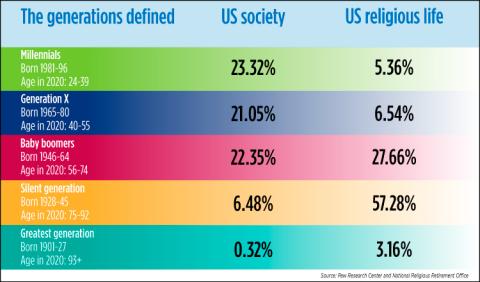
(Unsplash/Malin K.)
There are more generations living religious life today than ever before. As a Gen Xer (those born between 1965 to 1980), I've lived with members of the millennial generation (1981-96), baby boomers (1946-64), silent generation (1928-48) and greatest generation (1901-27). Some congregations have already welcomed Gen Z (born after 1996). My experience of religious life has always been intergenerational. I have never lived in community with another Gen Xer.
The workplace is now also made up of more generations than ever before. Gen Z have joined millennials, Gen X, baby boomers, and some silent generation folks working beyond standard retirement age. What is striking is the stark difference in generational distribution.
The accompanying chart compares generations in U.S. society versus religious life, using data from the Pew Research Center and National Religious Retirement Office.
While millennials make up almost a quarter of society, they are just over 5% of religious life. Conversely, while the silent generation makes up less than 7% in larger society, more than half of U.S. religious are of that generation.
What is the call of the Spirit for the present generations living religious life today? While religious life has always been intergenerational to some extent, this unique generational mix has never happened before.
We have a sacred window of opportunity for the present generations — youngest to oldest — to mix and mingle in community for mission. This opening is necessarily time limited. Those elders who entered in large numbers will be going home to their loving God in large numbers, but they are here now. The smaller numbers of younger members are also here, and everyone in between. Think of the possibilities!
I have found the work of Lindsey Pollak very helpful in my reflection. In her book The Remix: How to Lead and Succeed in the Multigenerational Workplace, Pollak borrows the idea of the remix from the music industry. For those who may be new to the term, a remix is created when an artist takes a classic song and adds or takes away elements "to create something both recognizable and entirely new."
Pollak observes that while it is not possible to live in two eras at once, "remixes give us that liminal experience." Liminality is a familiar term for women religious. Pollak points to the remix as the secret sauce to creating intergenerational teams and organizations. It "involves a combination of keeping the best, 'classic' workplace practices of the past while simultaneously embracing more modern and innovative approaches to work."
What might this look like in religious life? Where to start?
The key findings of the 2020 Study on Recent Vocations to Religious Life shine a light on common ground across generations.
Our religious vocation, the charism of religious life, is an endless call that brings us together. We are each drawn to prayer, spirituality, charism, community life and mission. We share a common commitment to living simply and in solidarity with the poor. We would not be living the life if we were not filled with abundant hope for religious life amid our changing demographics.
The study highlights what attracted those who entered since 2003. The top five attractions — spirituality (95%), charism (94%), mission (93%), prayer life (93%) and community life (92%) — give us direction for where remixes can be made. In the workplace, the remix is geared toward productivity and profit. In religious life, it is about mission! Each generation brings their own flavor, and the remix spices it all up in a new way, for the sake of God's mission.
Advertisement
Pollak's helpful hints for remixers also apply to remixers in religious life.
Stop the generational shaming. We've all been guilty of relying on stereotypes, whether of our own or other generations. Pollak calls us to stop. Now.
Empathize. Use this sacred time of opportunity to encounter different generational perspectives and worldviews. Take time to understand values and expectations.
Assume best intentions. Give your community members the benefit of the doubt when they say or do something you don't understand or disagree with.
Think "and" not "or." Resist the pull of either/or.
Remember that "common sense is not so common." Discerning together, rather than assuming, expectations and boundaries allows members of all generations to feel at home.
Don't change what works. Pollak differentiates between "roots" — the core identity — and "anchors" — the practices or habits that weigh you down. Let go what no longer serves. Keep what does.
Be more transparent. While sometimes it is not possible to share information, whenever possible be transparent.
It's OK if everyone wins. Each generation can contribute, communicate and share a sense of purpose.
I already see signs of the remix emerging in religious life, in local communities, at the congregation level, and nationally through the Discernment on the Future of Religious Life initiative of the Leadership Conference of Women Religious. The present generations are coming together, listening to one another and to the call of the Spirit for our present and future.
During a roundtable conversation hosted by LCWR in June, I gained two new perspectives. Constance Phelps of the Sisters of Charity of Leavenworth, Kansas, reflected that our past experiences impact our future horizon. She made me appreciate in a new way that we need all of the experience present in religious life today to help us embrace the future God is calling us to.
This realization was expanded further when Yesenia Fernández of the Missionary Guadalupanas of the Holy Spirit spoke of the call to steward the whole of religious life. The remix is beyond my own congregation. It is for the global sisterhood of today and tomorrow.
I look forward to dancing with my sisters, near and far, to the tune of our remixed religious life. In the words of Lindsay Pollak: "I like music remixes because they celebrate the fact that I've been around for a while and they make me feel current. They offer a memory and a discovery." This, I believe is what the Spirit is calling us to — each of us, every generation, for the life of the world.
I can't wait to see what we discover next.






